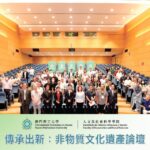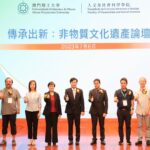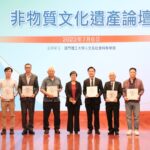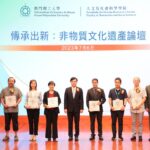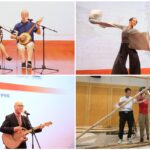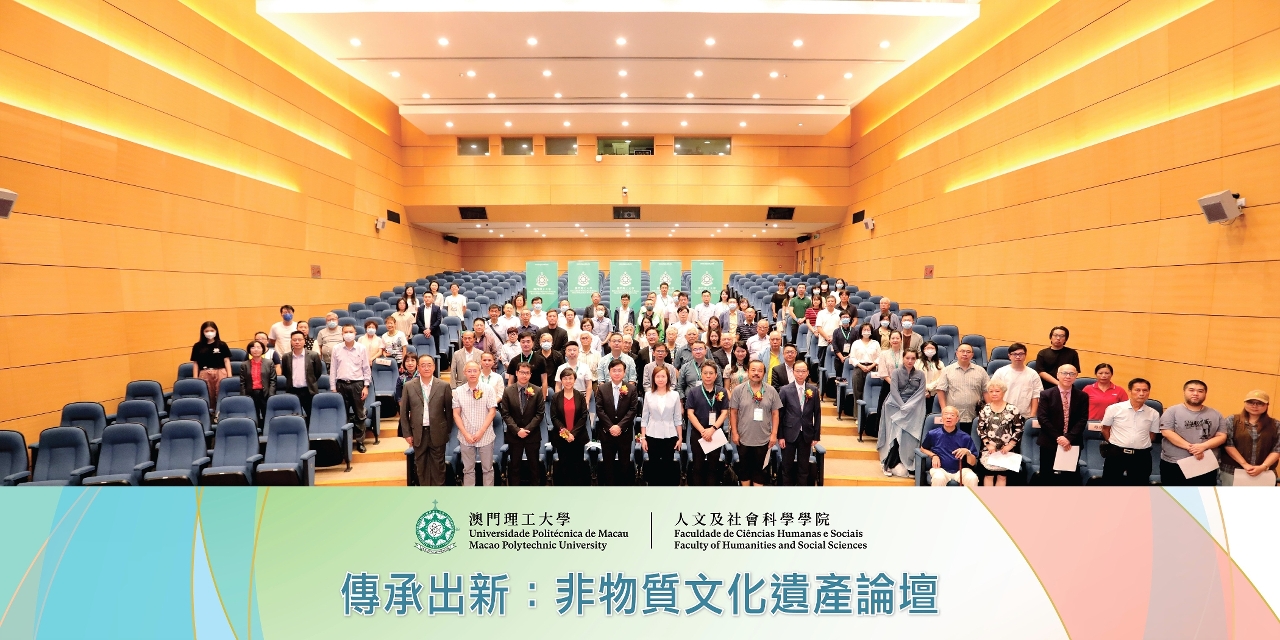 Macao Polytechnic University held "Inheritance and Innovation: Forum on Intangible Cultural Heritage"
Macao Polytechnic University held "Inheritance and Innovation: Forum on Intangible Cultural Heritage"
To support the development of Macao's cultural and tourism industry, to deepen thecultural developmentof the Greater Bay Area, and align withMacao's goal of becoming "a platform for cultural exchange and cooperation by promoting Chinese culture as the mainstream whilst preserving the unique pluralistic cultural heritage of Macao", the Faculty of Humanities and Social Sciences ofMacao Polytechnic Universityheld the "Inheritance and Innovation: Forum onIntangible Cultural Heritage" on July 6th. The forum aimed to explore the theoretical and practical issues related to the intangible cultural heritage (ICH) protection, inheritance and rejuvenation. The forum included academic presentations delivered by the eminent scholars in the field, in addition to the demonstrations ofintangible cultural heritage performedby the living masters, inheritors and safeguarding units. The forum not only showcases the charm of intangible cultural heritage, but also highlights the diversity of Macao's culture. More than 100 experts, scholars, inheritance masters from Beijing, Shandong, Guangdong, and Macao attended the event, together with the faculty members and students of Macao Polytechnic University.
The opening ceremony of the forum was held at 9:30am on July 6th at the auditorium of Macao Polytechnic University. The ceremony was officiated by the following guests, including the Director of theMacao Government Tourism Office, Maria Helenade Senna Fernandes; the Rector ofMacao PolytechnicUniversity, Im Sio Kei; the Director of the Macao Museum, Lou Ho Ian; the committee member of theCultural Heritage Committeeof the Macao SAR government, António Rossano de Jesus Monteiro; the Director of China National Intangible Cultural Heritage Research Centre at Sun Yat-sen University, Song Junhua; the Director of the Institute of Intangible Cultural Heritage at Shandong University, Zhang Shishan; the Director of the Centre for Research and Development of Intangible Cultural Heritage atBeijingNormal University, Gao Bingzhong; the Dean of the Faculty of Humanities and Social Sciences of Macao Polytechnic University, Lam Fat Iam; and the Director of Centre of Sino-Western Cultural Studies of Macao Polytechnic University, Wang Xi.
The Dean of the Faculty of Humanities and Social Sciences of Macao Polytechnic University, Lam Fat Iam delivered the welcome and opening speech. Lam stated that the Centre of Sino-Western Cultural Studies at Macao Polytechnic University has long been committed to produce research and social services related to Macao's historical and cultural heritage. The centre actively participates in Macao’s developmentas an "exchange and cooperation base by havingChinese cultureas the mainstream with the coexistence of diverse cultures" and hopes that holding the forum will contribute to the development of Macao's cultural and tourism industry and the construction of the Greater bay area. After many years of cultivation, "intangible cultural heritage" has become a distinctive academic field of the Macao Polytechnic University. The Centre has been actively assisting local intangible cultural heritage associations in collecting, organising, researching, and safeguarding different intangible cultural heritage assets. For instance, the Centre has invited many inheritance masters and heritage practitioners to participate inoral interviewsand ethnographic studies in order to jointly safeguard the heritage values embedded. The Centre has published many monographs documenting Macao's intangible cultural heritage assets. By collaborating with multiple media outlets and disseminating related content, we aim to promote Macao's intangible cultural heritage and make it deeply rooted in people's hearts. The university has also completed the compilation of the "Chinese Arts and Crafts Encyclopedia- Macao Volume" commissioned by theMinistry of Industryand Information Technology. Together with Sun Yat-sen University, the Faculty of Humanities and Social Sciences of Macao Polytechnic University has successfully obtained the approval of the Ministry of Education for being one of the key research bases for the humanities and social sciences in China. Currently, the faculty is commissioned by theCultural Affairs Bureauto undertake a research investigation on Macao's intangible cultural heritage which will last for two and a half years. Looking to the future, the Centre will continue to strengthen its exchange and cooperation with academic circles both domestically and abroad, as well as local intangible cultural heritage organizations in Macao. We will continue to contribute our academic strength to the construction of Macao's cultural base.
At the opening ceremony, Au Kuan Cheongand AoIeong Iok Peng performed the "Southern (Cantonese) music" (nanyin); Zhang AiTong performed the Han and Tang Classical Dance, "Luo Water People"; the "MacaoPeople Band", Filomen Antonio Manhão Jorge (Russo) performed Patua music; Chiu Tak Siudemonstrated his excellent skills in making bamboo scaffolding; the son of the founder of million-strand cotton candy, Kenny Yuen, demonstrated the skill of makingmillion-strand cotton candy. The support given by the above inheritors showcased the charm of intangible heritage.
In addition, the intangible heritage books published by Macao Polytechnic University were presented as gifts to thank the experts, scholars, and heads of Macao intangible-heritage associations who attended and supported the event. In the session ofkeynote speeches, Song Junhua talked about "Sustainable Development andSystematic ProtectionofIntangible Cultural Heritage". Zhang Shishan talked about "Macao Fisherman's Festival - From Fellow Townsmen and Fellow Practitioners to Social Public Culture". Gao Bingzhong presented "Intangible Heritage Projects and Cultural Themes", and lastly Lam Fat Iam concluded "Inheritance and Innovation - Macao's Practice in the Protection of Intangible Cultural Heritage".


